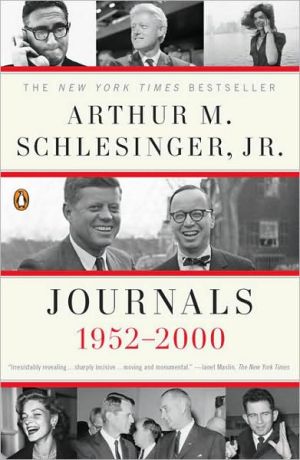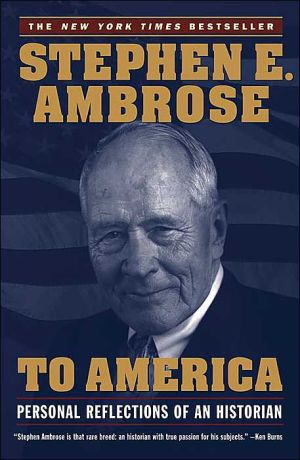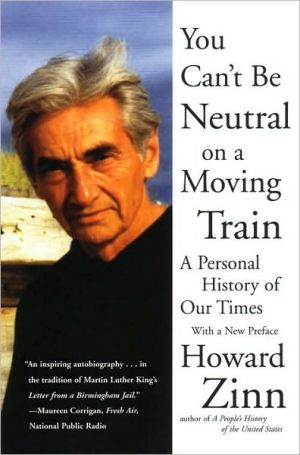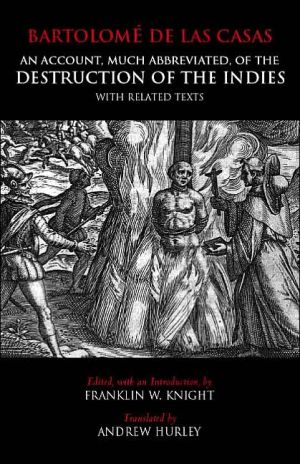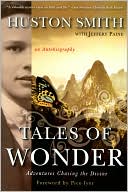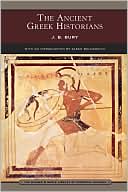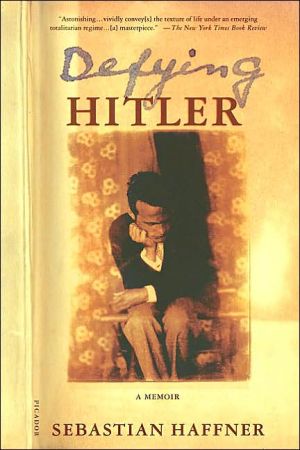Journals: 1952-2000
From his entrance into Democratic leadership circles in the 1950s through his years in the Kennedy administration and up until his last days, Arthur Schlesinger, Jr., was always at the vital center of American politics. For more than half a century, the master historian recorded his experiences and opinions in journals that together form an intimate chronicle of life at the highest levels of American politics and culture in postwar America. This extraordinary volume contains his candid...
Search in google:
From his entrance into Democratic leadership circles in the 1950s through his years in the Kennedy administration and up until his last days, Arthur Schlesinger, Jr., was always at the vital center of American politics. For more than half a century, the master historian recorded his experiences and opinions in journals that together form an intimate chronicle of life at the highest levels of American politics and culture in postwar America. This extraordinary volume contains his candid thoughts about the signal events of our time, from the Bay of Pigs to the devastating assassinations of the 1960s, from Vietnam to Watergate, and from the fall of the Soviet Union to Bush v. Gore. Filled with Schlesinger's trademark acerbic wit and tremendous insight, Journals is a fitting tribute to a most remarkable American life. The New York Times Book Review - Maureen Dowd It's hard not to like a book that expounds on Marilyn Monroe on one page and the Monroe Doctrine on the next. When Arthur M. Schlesinger Jr. ruminates on the realm of hemispheric affairs, the transition from one Monroe to the other is seamless, as is the slide from Bosnia to Bianca Jagger and from Alexander Hamilton to Angie Dickinson. His diaries are a Tiffany's window of name-dropping. This is not history so much as historical trail mix.
\ From Barnes & NobleReaders know Arthur M. Schlesinger Jr. (1917-2007) as the Pulitzer Prizewinning author of The Age of Jackson and A Thousand Days. But the Harvard historian who gave us the monumental three-volume Age of Roosevelt also made history himself as a special assistant to President John F. Kennedy and an informal adviser to Adlai Stevenson, Robert F. Kennedy, George McGovern, and other liberal politicians. In this two-volume collection of his journals, edited by his son, Schlesinger writes candidly about events from the Cold War era to the election of George W. Bush. Keen observations by an eyewitness and participant in his times.\ \ \ \ \ Janet MaslinThis arch, irresistibly revealing book manages to be both showstopping and doorstopping, what with its vast range of subject matter and unfettered private sniping…The lively, confiding voice of these journals is also dutiful, conscientious, ever aware of history, eager to record after-dinner conversations for posterity's sake. There are times, as when the Rolling Stone publisher Jann Wenner says, in 1975, that recession "greatly contracts one's scope for frivolity," that Mr. Schlesinger seems to do something of which he accuses Ben Bradlee's profanity-laced memoirs of John F. Kennedy: putting his own language into others' mouths. But by and large, steadily allotting about 18 pages a year (1999 is unaccountably missing), this book creates a moving and monumental 48-year chronicle.\ —The New York Times\ \ \ Jon MeachamSchlesinger kept up a pungent and penetrating running commentary on—well, on everyone. The whole world seems to be here: the Roosevelts and the Kennedys, Adlai Stevenson and Norman Mailer, Lauren Bacall and Ted Sorensen, Groucho Marx and Jesse Jackson, Mick Jagger and Fidel Castro, Averell Harriman and Bill Clinton, Marlene Dietrich and Al Gore. Schlesinger wrote formal history with sweep and passion and wit. Now he has given us a final gift: informal history with the same sweep, the same passion and the same wit…It will be a long time before we see another collection of journals as rich, as fascinating and as illuminating as Schlesinger's.\ —The Washington Post\ \ \ \ \ Maureen DowdIt's hard not to like a book that expounds on Marilyn Monroe on one page and the Monroe Doctrine on the next. When Arthur M. Schlesinger Jr. ruminates on the realm of hemispheric affairs, the transition from one Monroe to the other is seamless, as is the slide from Bosnia to Bianca Jagger and from Alexander Hamilton to Angie Dickinson. His diaries are a Tiffany's window of name-dropping. This is not history so much as historical trail mix.\ —The New York Times Book Review\ \ \ \ \ Publishers WeeklyCultural and political commentator Schlesinger (1917-2007) formed his left-leaning worldview during FDR's New Deal; a liberal scholar and historian, Schlesinger produced more than 25 books (his last was 2005's War and the American Presidency), won two Pulitzers and became a powerful force in shaping liberal political thought. Taking readers through Schlesinger's diaries year by year, the book begins with Schlesinger's first encounters with presidential candidate Adlai Stevenson, for whose (unsuccessful) campaign he would become a speech writer; fortunately, off years pass quickly (1953-1959 take up fewer than 30 pages), picking up again in 1960, when Schlesinger became special adviser to President Kennedy. With characteristic candor, Schlesinger weighs in on both: of Stevenson, "probably even more conservative than I had thought"; of JFK, "[he] has most of FDR's lesser qualities. Whether he has FDR's greater qualities is the problem for the future." Subsequent years bring the expected: Vietnam and LBJ, the assassination of Robert Kennedy, Nixon and Watergate, the rise of Reagan and the fall of the Soviets, the first Gulf War and the second George Bush, all viewed through Schlesinger's singular perspective. Interspersed among an endless, engrossing parade of lunches with luminaries such as Henry Kissinger and Jacqueline Onassis, Schlesinger discusses his own work and a few personal details ("Another year; another house . . . spent most of the month getting settled at 118 East 82nd Street with my beloved Alexandra"). Most of the memoir, however, is a pleasingly understated whirlwind of big names and bigger issues. Rich in insight and cagily observed history, Schlesinger's weightymemoirs will mesmerize political junkies; even lay readers will be charmed and fascinated by Schlesinger's take on the 20th century's last half. (Oct.)\ Copyright 2007 Reed Business Information\ \ \ \ \ Janet Maslin[A] posthumous bombshell . . . moving and monumental. \ — The New York Times\ \ \ \ \ The Boston GlobeFor those who wish to understand the politics of those five decades, Journals is essential.\ \ \ \ \ Library JournalSchlesinger (1917-2007) was the preeminent liberal public intellectual of the post-World War II era: he authored 19 books, including Pulitzer Prize winners, and was regarded as the intellectual-in-chief of the Kennedy administration. His two sons Andrew (Veritas: Harvard College and the American Experience)and Stephen (Act of Creation: The Founding of the United Nations) have superbly winnowed their father's 6000-page journal into a readable account of his life. Although most entries in the book are serious and lengthy reflections on presidencies and presidential campaigns, especially those of Adlai Stevenson, JFK, and Robert Kennedy, also included are such amusing details as the fact that Schlesinger disliked Jimmy Carter because he reminded him of Nixon and he was annoyed by Rolling Stonepublisher Jan Wenner because he never picked up the lunch tab. Yet he hit it off with Mick Jagger when the rocker invited him and his wife to a party. Ultimately, Schlesinger's take on the last half of the 20th century will delight many, infuriate some, and inform all readers. Strongly recommended for all libraries.\ —Karl Helicher\ \ \
